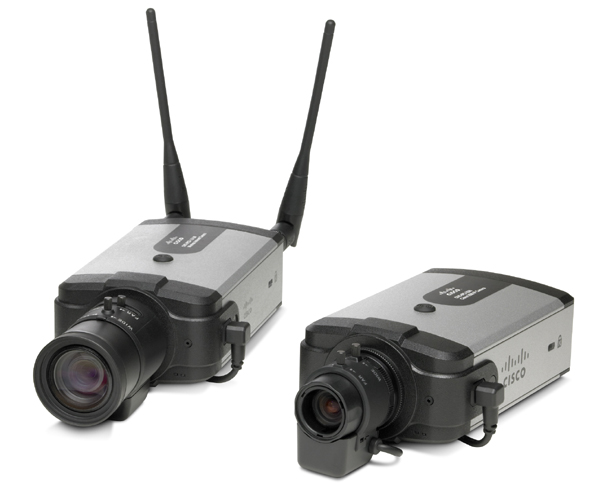An Internet protocol camera, or IP camera, is a type of digital video camera commonly employed for surveillance, and which, unlike analog closed circuit television (CCTV) cameras, can send and receive data via a computer network and the Internet. Although most cameras that do this are webcams, the term "IP camera" or "netcam" is usually applied only to those used for surveillance. The first centralized IP camera was Axis Neteye 200, released in 1996 by Axis Communications.
There are two kinds of IP cameras:
- Centralized IP cameras, which require a central network video recorder (NVR) to handle the recording, video and alarm management.
- Decentralized IP cameras, which do not require a central NVR, as the cameras have recording function built-in and can thus record directly to any standard storage media, such as SD cards, NAS (network attached storage) or a PC/server.
History
The first centralized IP camera was released in 1996 by Axis Communications. It was called the Axis Neteye 200 and was developed by the team of Martin Gren and Carl-Axel Alm. It used a custom web server internal to the camera. In late 1999, the company started using embedded Linux to operate its cameras. Axis also released documentation for its low-level API called "VAPIX", which builds on the open standards of HTTP and real time streaming protocol (RTSP). This open architecture was intended to encourage third-party software manufacturers to develop compatible management and recording software.
The first decentralized IP camera was released in 1999 by Mobotix. The camera's Linux system contained video, alarm, and recording management function, thus the camera system did not require licensed video management software to manage the recording event, or video management.
The first IP camera with onboard video content analytics (VCA) was released in 2005 by Intellio. This camera was able to detect a number of different events, such as if an object was stolen, a human crossed a line, a human entered a predefined zone, or if a car moved in the wrong direction.
IP cameras are available at resolutions from 0.3 (VGA resolution) to 29 megapixels As in the consumer TV business, in the early 21st century, there has been a shift towards high-definition video resolutions, e.g. 720p or 1080i and 16:9 widescreen format.
A network IP camera.
Standards
Analog closed circuit television uses established broadcast television formats (e.g. Common Intermediate Format (CIF), NTSC, PAL, and SECAM). Generally speaking, each make of IP camera will differ in its features and functions, video encoding (compression) schemes, available network protocols, and the API to be used by video management software.
In order to address issues of standardization of IP video surveillance, two industry groups were formed in 2008: the Open Network Video Interface Forum (ONVIF) and the Physical Security Interoperability Alliance (PSIA). While the PSIA was founded by 20 member companies including Honeywell, GE Security and Cisco, and ONVIF was founded by Axis Communications, Bosch and Sony, each group now has numerous members. As of January 2009, each group had released version 1.0 of their specification.
Potential advantages
- Two-way audio via a single network cable allows users to communicate with what they are seeing (e.g. gas station clerk assisting a customer on how to use the pay pumps)
- Flexibility: IP cameras can be moved around anywhere on a network (wireless).
- Distributed intelligence: with IP cameras, video analytics can be placed in the camera itself allowing ability in analytics solutions.
- Transmission of commands for PTZ (pan, tilt, zoom) cameras via a single network.
- Encryption & authentication: IP cameras offer secure data transmission through encryption and authentication methods such as WPA, WPA2, TKIP, AES.
- Remote accessibility: live video from selected cameras can be viewed from any computer, anywhere, and also from many mobile smartphones and other devices.
- IP cameras are able to function on a wireless network.
- PoE - Power over Ethernet: Modern IP cameras have the ability to operate without a power supply. They can work with the PoE-protocol.
- IP camera communication signals are not just electronic voltage, it is numerically decoded as bits and bytes with security features and TCP/IP protocol.
Potential disadvantages
- Higher initial cost per camera, except where cheaper webcams are used.
- High network bandwidth requirements: a typical CCTV camera with resolution of 640x480 pixels and 10 frames per second (10 frame/s) in MPEG mode requires about 3 Mbit/s.
- As with a CCTV/DVR system, if the video is transmitted over the public Internet rather than a private IP LAN, the system becomes open to a wider audience of hackers and hoaxers. Criminals can hack into a CCTV system to observe security measures and personnel, thereby facilitating criminal acts and rendering the surveillance counterproductive.
- public internet connection video is rather complicated to set up and requires a dynamic DNS. Recently, some producers of IP cameras (D-Link, Axis) have made their own software available with built-in dynamic DNS.
List of IP camera software
Following is a list of non-brand specific IP camera software, for various platforms, which may or may not offer remote (web) monitoring:
Windows
- SecurityTronix EVS
- Blue Iris
- NetcamStudio
- iSpy
- MultiEye
- Bikal
- Codestuff
- DeskShare
- go1984
- i2V VMS
- i-Catcher
- InitSys
- LuxRiot
- Netcam Watcher
- Nuuo
- Sicura Systems
- SoleraTec Phoenix RSM
- Vitamin D
- Webcam XP
- Camdox
- Genius Vision
OS X
- EvoCam
- SecuritySpy
- Vitamin D
Linux
- ZoneMinder
- Motion

